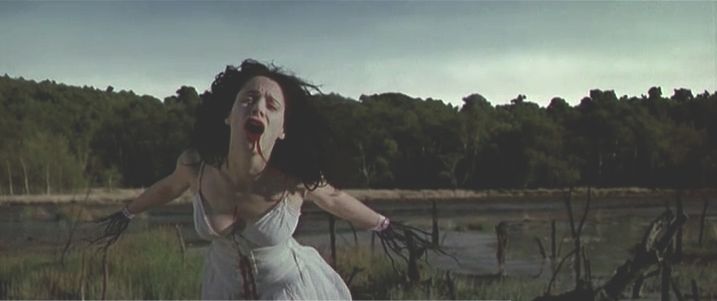Dr. Michael Delahoyde
Washington State University
TITUS ANDRONICUS
ACT II
SCENE i
Moors from north Africa invaded Spain and southern France in the 8th century,
Sicily and Italy in the 9th, although the term "Moor" was generally applied to
any Muslim. When the slave trade began bringing sub-Saharan black Africans into
Europe in the 15th century, the term "blackamoor" took hold (Asimov 402). Racial
problems also took hold with notions associating blackness with the Devil.
Accordingly, blackness in this play is primarily symbolic (Ogburn and Ogburn
349).
The Moor, Aaron, gloats with some eloquence over his being the lover of Tamora.
He tells himself to "arm thy heart, and fit thy thoughts, / To mount aloft with
thy imperial mistress, / And mount her pitch" (II.i.12-14) -- the last bit a term
from falconry. He calls her "This goddess, this Semiramis, this nymph, / This siren
that will charm Rome's Saturnine, / And see his shipwrack and his commonweal's"
(II.i.22-24). Aaron's "blackness sets him apart visually, and his cruel wit gives
him detachment of another kind" (Leggatt 248). Tamora's remaining two sons, Chiron
and Demetrius, enter on the verge of a duel over the right to court Lavinia.
"The play likewise began with a competition between two brothers ... for the
possession of Rome" (Leggatt 242).
Aaron warns them that this close to the palace the Emperor will find out and
Tamora will be dishonored. Furthermore,
What, is Lavinia then become so loose,
Or Bassanius so degenerate,
That for her love such quarrels may be broach'd,
Without controlment, justice, or revenge?
(II.i.65-68)
Demetrius explains,
She is a woman, therefore may be woo'd,
She is a woman, therefore may be won,
She is Lavinia, therefore must be lov'd.
(II.i.82-84)
|

|
Compare this passage with Shakespeare's Sonnet 41, with Richard III
(I.ii.229), and with the Earl of Oxford's poem "She is my joy" (Ogburn and
Ogburn 357).
Aaron says that Lavinia, like Lucrece (II.i.108), is too virtuous to give in
to a seduction, so they should be thinking more along the lines of force rather
than words. There will be that hunt, and "The forest walks are wide and spacious,
/ And many unfrequented plots there are, / Fitted by kind for rape and villainy"
(II.i.114-116). The word "plot" appears elsewhere in the play and suggests much
(Garber 75). Aaron also makes a Chaucerian allusion too:
The Emperor's court is like the house of Fame,
The palace full of tongues, of eyes, and ears;
The woods are ruthless, dreadful, deaf, and dull.
(II.i.126-128)
Sounds like a good idea to the doofs.
SCENE ii
Titus has had disturbing dreams, but he and his sons are ready for the
hunt. Saturninus and his batch enter and the hunting party assembles with
some innuendo from Saturninus and a grim prediction by Demetrius:
"Chiron, we hunt not, we, with horse nor hound, / But hope to pluck a
dainty doe to ground" (II.ii.25-26).
SCENE iii
Aaron has a plot prepared and hides a bag of gold under a tree before
Tamora arrives and comes on to him, beginning with an odd reverdie:
The birds chaunt melody on every bush,
The snake lies rolled in the cheerful sun,
The green leaves quiver with the cooling wind
And make a checker'd shadow on the ground.
(II.iii.12-15)
She compares herself and Aaron to Dido and Aeneas. But he's more in the
mood for revenge: "Madam, though Venus govern your desires, / Saturn is
dominator over mine" (II.iii.30-31). Passages such as this lead the elder
Ogburns to interpret Venus as Queen Elizabeth; Tamora as Mary, Queen of
Scots; and Tamora's sons as the traitors Howard and Arundel (Ogburn and
Ogburn 348-349). "This is the day of doom for Bassianus: / His Philomel
must lose her tongue to-day, / Thy sons make pillage of her chastity"
(II.iii.42-44). Garber notes that both Lucrece and Philomel are mentioned
before the rape in this play (Garber 78). Aaron gives Tamora a
"fatal-plotted scroll" (II.iii.47) and tells her to show it to the
King.
Bassianus and Lavinia wander along and Aaron goes off to get Tamora's
sons, telling her to be contentious. Bassianus outrageously compares
Tamora to the chaste Diana, which sort of makes him Actaeon, ominously.
Tamora goads Bassianus and Lavinia into reproving her adultery in this
"plot" (II.iii.77) with "a barbarous Moor" (II.iii.78). Bassianus threatens
to tell Saturninus. Chiron and Demetrius arrive and Tamora claims that the
two were about to tie her up and leave her to die in this valley where at
night thousands of toads and snakes would emerge. Oh and also they called
her a "foul adulteress" (II.iii.109).
And had you not by wondrous fortune come,
This vengeance on me had they executed:
Revenge it, as you love your mother's life,
Or be ye not henceforth call'd my children.
(II.iii.112-15)
Demetrius and then Chiron abruptly stab Bassianus. Lavinia curses Tamora
and the Queen asks for a knife to kill the girl. Demetrius suggests that
she deserves worse. Chiron specifies: "Drag hence her husband to some
secret hole, / And make his dead trunk pillow to our lust" (II.iii.129-130).
Tamora advises the boys to kill Lavinia when they are done. Lavinia begs
Tamora to stop this, but Tamora reminds her that no one listened to her
when she was begging for the life of her other son. Lavinia asks to be
killed but Tamora won't allow it. Demetrius and Chiron dump Bassianus'
corpse in a pit Aaron had told them about, and they drag off Lavinia.
The salient point here is not that Shakespeare was capable of so graphic
and nightmarish an image of female sexuality, nor that Freud was not the
first to invent Freudianism, but rather that the play -- and the stage --
opens up to become a living metaphor, a dream landscape all too aptly
representing the key events that have just taken place: the marriage of
Saturninus and the lustful Tamora, the murder of Bassianus, and the rape
of Lavinia. This imaginative use of the stage as a figure for the psyche,
a geographical literalization of illicit / desire, may hark back in some
ways to medieval theater practice and the "hell mouth" of the early stage.
(Garber 78-79)
Aaron brings Titus' sons Quintus and Martius, seemingly drugged, to the
pit where he says is a panther. Martius falls in and discovers Bassianus'
body. Note (II.iii.200f) that Quintus "describes the mouth of the pit as
stained with blood" (Leggatt 246).
Aaron runs off to fetch the King. Martius is horrified but recognizes
Bassianus' ring. Trying to help him out, Quintus drops in too. Saturninus
arrives and then Tamora, Titus, and Lucius. Tamora gives Saturninus the
letter -- "this fatal writ, / The complot of this timeless tragedy"
(II.iii.264-265) -- framing the Andronicus boys with a plot to murder
Bassianus for the hidden bag of gold, which, lo, is discovered by Aaron
right where he hid it. Saturninus commands the imprisonment of Quintus
and Martius: "There let them bide until we have devis'd / Some
never-heard-of tottering pain for them" (II.iii.284-285) -- like at the
end of Much Ado About Nothing and Othello. Titus begins to
beg for some mercy until proof can be found, but Saturninus insists there
already is ample proof of their guilt. Bail is not granted, and "Let them
not speak a word" (II.iii.301). Tamora promises Titus she'll entreat the
King.
SCENE iv
Chiron and Demetrius return with Lavinia, whose tongue they've cut off so
that she cannot identify them verbally. They have chopped her hands off so
that she cannot identify them in writing. Marcus finds her and asks "what
ungentle hands / Hath lopp'd and hew'd, and made thy body bare / Of her
two branches" (II.iv.16-18). The word "lopped" was used in the first act
in reference to Alarbus (Garber 80), as was "hewed." When Marcus sees blood
pouring from her mouth, he seems to recognize the motive for the mutilations.
Unlike Philomela, she cannot convey her story in needlepoint. He wishes he
knew more: "Sorrow concealed, like an oven stopp'd, / Doth burn the heart
to cinders where it is" (II.iv.36-37). He laments the loss of her musical
abilities: "O, had the monster seen those lily hands / Tremble like aspen
leaves upon a lute" (II.iv.44-45), "Or had he heard the heavenly harmony
/ Which that sweet tongue hath made" (II.iv.48-49). Marcus anticipates
Titus' inconsolability and leads her off.
The monologue seems awkwardly melodramatic and stilted. But perhaps Wells
is right: Marcus' description "may read like a heartless verbal exercise"
but it should become "a deeply moving attempt to master the facts and thus
to survive the shock, of a previously unimagined horror" (Wells 75-76).
In any event, "Violence against women, the denial of women's language --
these are issues to which we are now, with good reason, particularly alert"
(Leggatt 241).

Act III
Shakespeare Index

